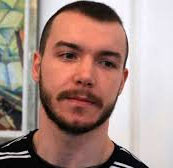A discovery made a few days ago by a young curator from the museum in Karlovo, caused a real sensation for the general public and for researchers of the life and work of the great Bulgarian revolutionary and fighter for the Liberation of Bulgaria, Vasil Levski. The name of the curator is Viktor Kombov, who, during his brief scientific trip to the State Archives in Istanbul, found previously unknown for Bulgarian researchers photo of the Apostle of Freedom. It is supposed that this was the photo used when Ottoman Empire authorities were searching for Levski. Proof of this, according to the experts, is that on the back of the photo there is also a description of Levski, written in Ottoman-Turkish language. Apart from the fact that the man is from Karlovo, distinctive facial features are also described - "medium-sized, with bright chestnut mustache, ruddy face. When he talks, one tooth shows a little outside as he slightly lifts his lips; his eyes are big and blue/green in color." Together with the photo, which is the most important find, there are other documents, also written in Ottoman-Turkish language. "They are still being translated, but they certainly contain more information about the Apostle and his revolutionary organization," researcher Viktor Kombov says.
"We assume that this picture is the original from which a small oval portrait was later made," Dora Chausheva, director of the Vasil Levski National Museum in Karlovo says and adds:
"It was most likely taken after the General Assembly held in Bucharest from 29 April to 5 May 1872, but apparently the Apostle did not manage to get a copy of those portraits he had ordered. How this photo reached the hands of the Ottoman authorities is unknown. I think this happened through their intelligence agents in Wallachia. Moreover, photographic studios were not that many back then. Here we have the image combined with this first verbal description, which was heard during the questioning of Ivan Furnadzhiev, a member of the Teteven Revolutionary Committee on October 26, 1872. After that they already have enough information about him.”
This finding confirms the researchers' view that there are more documents related to the personality and the work of Vasil Levski, which so far have not been known for the Bulgarian community, as well as for the scientific community as a whole. "Today we can clearly say that there is a need to continue working with the archives kept in Turkey and not only there. In Bucharest and Belgrade there are still many things we have not reached and that could open a new window in the research of Vasil Levski," Dora Chausheva points out.
 "I feel lucky and I am very glad that our museum has made such a substantial discovery related to Levski," Viktor Kombov says:
"I feel lucky and I am very glad that our museum has made such a substantial discovery related to Levski," Viktor Kombov says:
"I went to the Ottoman Archives in Istanbul on October 9 this year and on the same date I came across the valuable find. The colleagues from the Ottoman Archives have very well structured their systems and it is very easy to find archival units. That is why we are grateful to them. The story of this discovery is quite interesting. We have a lot of visitors and we keep in touch with scientists from all over the world. When Turkish historians once came, we talked to them and it turned out that they were working on the period of the Ottoman Empire and the events related to the Liberation of Bulgaria. I realized that something new about Vasil Levski in the Ottoman archives in Istanbul could be found. Together with the museum’s director we decided to make a scientific expedition to Istanbul. In the catalog, which I was provided with, I came across a curious archival unit with a photograph of Vassil Levski, which was not known in Bulgaria before. I admire Vasil Levski and he is a role model for each of us. This is a person with a clear purpose in his life - the noble mission dedicated to the liberation of the Bulgarian people. Until his death he constantly followed this mission. He did everything he could to achieve it."
The extraordinary honesty of Levski, who felt his companions were completely equal to him and in no way took advantage of his power as a leader of the revolutionary organization is another prominent characteristic, Viktor Kombov says. "His ideas are truly pure. He wanted future liberated Bulgaria to be 'a democratic republic in which all people and religions live under a common law in peace and understanding”, the young researcher says in conclusion.
English: Alexander Markov
June 11, 2007 - US President George W. Bush Jr. visits Sofia. According to protocol, the press conference he held for the media took place among the exhibits of the National Archaeological Museum. The official lunch for the guest was later held at the..
On November 10, 1989, a plenum of the Central Committee of the Bulgarian Communist Party ousted its General Secretary and Chairman of the State Council, Todor Zhivkov. This marked the symbolic beginning of the transition from a one-party system to..
Archaeologists have explored a necropolis in the Kavatsi area near Sozopol. The perimeter in which it is located is part of the history of Apollonia Pontica and is dated to the 4th century BC. "This is a site with interesting burials in which a nuance..
The Museum of the Jewish People in Tel Aviv , Israel, today commemorates the 130th anniversary of the birth of Dimitar Peshev, a righteous man of the..
The Feast of the Epiphany - the entry of the Theotokos into the Temple - is one of the oldest and most revered feasts in the Orthodox world. It was..

+359 2 9336 661
